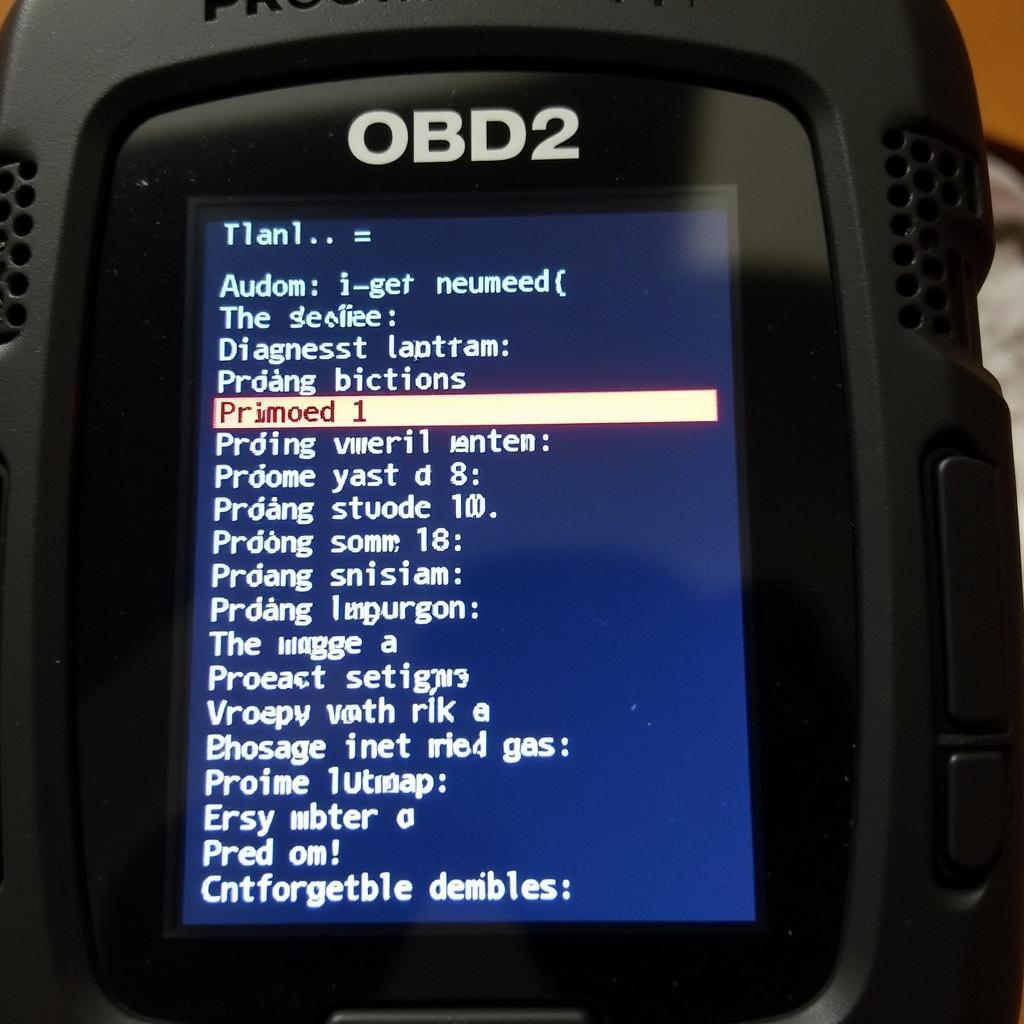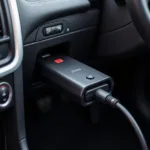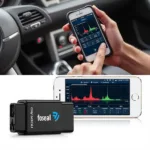Understanding your car’s security system can be a daunting task, especially when it comes to the technical aspects. One common question we encounter is the relationship between a car alarm and the OBD2 port. Can an OBD2 scanner actually shed light on your car alarm system? The answer is, in many cases, yes.
The Role of the OBD2 Port in Car Alarms
Your car’s OBD2 port, often located under the dashboard on the driver’s side, serves as a diagnostic portal. It provides a wealth of information about various systems in your vehicle, including, in some cases, the alarm system.
While not all car alarm systems are fully integrated with the OBD2 system, many modern vehicles do offer some level of communication. This means that an OBD2 scanner, especially a more advanced model, can potentially access data related to your car alarm.
What Information Can an OBD2 Scanner Reveal About Your Car Alarm?
The specific information you can glean from your car’s OBD2 port about the alarm system varies depending on the make, model, and year of your vehicle. However, some common data points often accessible include:
- Alarm Trigger History: This log can tell you what triggered your alarm, such as a door opening, impact detection, or motion sensors.
- Alarm System Status: This provides information on whether the alarm is armed, disarmed, or if there are any faults detected within the system.
- Sensor Status: Some vehicles allow you to check the status of individual sensors connected to the alarm system, such as door, hood, and trunk sensors.
 OBD2 Scanner Displaying Car Alarm Diagnostic Trouble Codes
OBD2 Scanner Displaying Car Alarm Diagnostic Trouble Codes
Using an OBD2 Scanner to Diagnose Car Alarm Problems
Knowing that your car alarm and OBD2 port can communicate opens up opportunities for troubleshooting. If you’re experiencing issues with your alarm, an OBD2 scanner can be a valuable tool to:
- Identify Faulty Sensors: If a specific sensor is malfunctioning and triggering false alarms, the OBD2 scanner might be able to pinpoint the culprit.
- Diagnose Wiring Problems: The scanner can sometimes detect issues with wiring harnesses connected to the alarm system.
- Read and Clear Alarm Codes: Just like your engine, the alarm system can store diagnostic trouble codes. An OBD2 scanner can read these codes, providing insight into the problem and allowing you to clear them after addressing the issue.
Limitations of OBD2 Scanners and Car Alarms
It’s important to remember that OBD2 scanners, even professional-grade ones, might not provide a comprehensive view of your car alarm system. Some limitations include:
- Manufacturer-Specific Protocols: Car manufacturers often use their proprietary protocols for alarm systems, limiting the information accessible through standard OBD2 communication.
- Basic Scanner Capabilities: Entry-level or generic OBD2 scanners might not have the functionality to delve into alarm system data.
- Complex Alarm Systems: Advanced alarm systems with features like remote start, GPS tracking, or two-way communication might have dedicated control modules that are not fully accessible through the OBD2 port.
When to Consult a Professional
While an OBD2 scanner can be a helpful tool for understanding and diagnosing car alarm issues, certain situations warrant professional help:
“When dealing with intricate car alarm systems, it’s crucial to remember that what you see on your OBD2 scanner may not tell the whole story,” says John Smith, Senior Automotive Technician at XYZ Auto Repair. “For in-depth diagnostics and repairs, especially for integrated security systems, consulting a qualified technician is often the safest and most efficient route.”
If you’re dealing with persistent alarm problems, suspect wiring issues, or your OBD2 scanner reveals codes you don’t understand, it’s best to consult a qualified automotive electrician or your dealership’s service department.
Conclusion
The connection between your car alarm and the OBD2 port can be a valuable resource for understanding and troubleshooting your vehicle’s security system. While an OBD2 scanner can provide helpful information, remember its limitations and don’t hesitate to seek professional assistance when needed.
FAQs about Car Alarms and OBD2 Ports
1. Can I disable my car alarm through the OBD2 port?
Disabling a car alarm through the OBD2 port is not recommended and often not possible. Tampering with the alarm system could lead to unintended consequences and affect your vehicle’s warranty.
2. Will resetting my car’s ECU affect the alarm system?
In most cases, resetting the ECU will not directly impact the alarm system. However, it’s always best to consult your owner’s manual or a professional if you have concerns.
3. Can I install an aftermarket car alarm that integrates with the OBD2 port?
Yes, some aftermarket alarm systems are designed to interface with the OBD2 port, allowing for features like remote start and vehicle tracking.
4. My OBD2 scanner shows an alarm code. What should I do?
If your scanner displays an alarm-related code, make note of it and refer to your vehicle’s service manual or search online for its meaning. If you’re unable to diagnose or fix the issue yourself, consult a professional.
5. Can I use an OBD2 scanner to program a new key fob to my car alarm?
Programming key fobs usually requires specialized equipment and procedures. While some OBD2 scanners might offer this functionality, it’s best to consult your owner’s manual or a dealership for assistance.
Looking for more information about OBD2?
Check out these related articles:
Need further assistance? Contact our 24/7 support team via WhatsApp: +1(641)206-8880, or Email: [email protected]. We are here to help!

